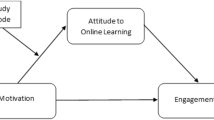Abstract
Research has demonstrated that student evaluations of instruction are influenced by variables extraneous to the instructional procedures being evaluated. One of the most important of these is the student's motivation to take the course. The Instructional Development and Effectiveness Assessment (IDEA) system controls this variable by comparing a course evaluation to a norm group of courses having students with similar motivation. The present study examined the possibility that the IDEA procedure of having students rate their precourse motivation at theend of a course might be unacceptable, because the rating would be influenced by experiences within the course itself. The data indicated that postcourse ratings of precourse motivation do deviate somewhat from actual precourse ratings, but the deviation is not of an order of magnitude which would seriously distort the interpretation of the ratings.
Similar content being viewed by others
References
Abrami, P. C., Leventhal, L., Perry, R. P., & Breen, L. J. Course evaluation: how?Journal of Educational Psychology 1976,68 3 300–304.
Carrier, N. A., Howard, G. S., & Miller, W. G. Course evaluation: when?Journal of Educational Psychology 1974,66 4, 609–613.
Cashin, W. E., & Slawson, H. M.IDEA technical report No. 2: description of data base 1976–1977. Manhattan, Kansas: Center for Faculty Evaluation and Development in Higher Education, 1977.
Costin, F., Greenough, W. T., & Menges, R. J. Student ratings of college teaching: reliability, validity, and usefulness.Review of Educational Research 1971,41 511–535.
Festinger, L.A theory of cognitive dissonance. Stanford: Stanford University Press, 1957.
Holmes, D. S. Effects of grades and disconfirmed grade expectancies on student's evaluations of their instructor.Journal of Educational Psychology 1972,63 2, 130–133.
Hoyt, D. P. Measurement of instructional effectiveness.Research in Higher Education 1973,1 367–378(a).
Hoyt, D. P. Identifying effective instructional procedures.Improving College and University Teaching 1973,21 1, 73–76(b).
Hoyt, D. P., & Howard, G. S. The evaluation of faculty development programs.Research in Higher Education 1978,8 25–38.
Hoyt, D. P., Owens, R. E., & Grouling, T.Interpreting student feedback on instruction and courses. Manhattan, Kansas: Kansas State University, 1973.
Stone, E. F., Rabinowitz, S., & Spool, M. D. Effect of anonymity on student evaluations of faculty performance.Journal of Educational Psychology 1977,69 (3), 274–280.
Author information
Authors and Affiliations
Rights and permissions
About this article
Cite this article
Howard, G.S., Schmeck, R.R. Relationship of changes in student motivation to student evaluations of instruction. Res High Educ 10, 305–315 (1979). https://doi.org/10.1007/BF00975522
Issue Date:
DOI: https://doi.org/10.1007/BF00975522




